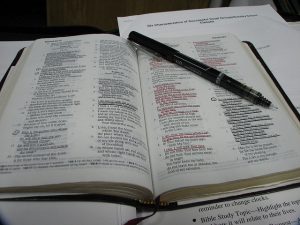
Last week LifeWay Research released the results of their latest poll of Americans’ thoughts about and readership of the Bible. It turns out that overall Americans continue to hold this sacred text in high regard even as readership rates and biblical literacy decline.
Previous research by the American Bible Society found that at least one Bible is present in 87% of American homes. Also, more than 75% of American homes have an Internet connection they could use to access the Bible online. Taken together these data points suggest than well over 9 in 10 Americans have easy access to the Bible.
Bible Reading: Key Findings
- 1 out of 2 (53%) respondents have read little or none of the Bible
- 1 out of 5 (22%) respondents read a little bit of the Bible each day
- 1 out of 2 (52%) respondents consider the Bible to be a good source of morals
- 1 out of 3 (35%) respondents consider the Bible to be life-changing
So What?
The folks at LifeWay clearly believe that more Bible reading is a good thing. Their comparative analysis of respondents who they characterized as Evangelical (using the NAE LifeWay Research Evangelical Beliefs Research definition) versus those who do not qualify as such show that Evangelicals do, as expected, place a greater emphasis on the Bible.
- The percentage of Evangelicals who have read the whole Bible is 100% greater than those who are not Evangelical (18% versus 9%)
- The percentage of Evangelicals who read the Bible on a daily basis is 200%+ greater than those who are not Evangelical (49% versus 16%)
- The percentage of Evangelicals who view the Bible as life-changing is 210%+ greater than those who are not Evangelical (81% versus 26%)
For those that follow the Way of Jesus, the Bible is a valid and valuable resource. How one approaches the Bible and with what frequency should be influenced by and consistent with one’s religious affiliation (Mainline, Evangelical, Agnostic, adherent of a world religion that does not consider the Bible to be a sacred text, etc.) and one’s view of the Bible (actual Word of God, inspired, or book of fables/stories).
In the words of Ronald Hendel, professor of Hebrew Bible and Jewish Studies at the University of California – Berkeley,
. . . it is a book that lies at the heart of western culture, and it still has a claim on us, whether we believe in it or not. We still define ourselves and our world in relation to it. Even if we reject it, we are taking a stand and acknowledging its presence. It’s like the 800 pound gorilla in the middle of the room. You can try to ignore it, but you still have to walk around it.
Take a few minutes to reflect on your own understanding of and interactions with the Bible.
- How much of the Bible have you read?
- How often do you read the Bible?
- What is your view of the Bible (actual Word of God, inspired, or book of fables/stories)? Has your perspective changed over time? If it has changed, what were key reasons for that change? If it has remained stable, what has contributed to this stability?
- If you follow the Way of Jesus, which religious group to do you belong to (Mainline, Evangelical, Catholic, etc.)? How is your view of the Bible informed by this tradition?